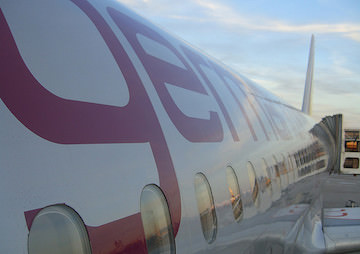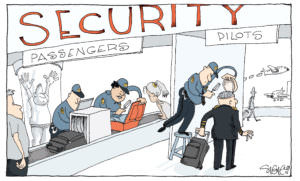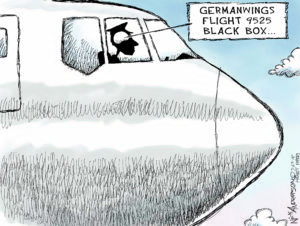The Mark of Terror
French prosecutor Brice Robin has said, "There is no reason to suspect a terrorist attack" in Germanwings copilot Andreas Gunter Lubitz's crashing of a crowded airliner into a mountainside. But I disagree. The exterior of a Germanwings airliner. Alexander Kaiser (CC BY 2.0)
The exterior of a Germanwings airliner. Alexander Kaiser (CC BY 2.0)
WASHINGTON — We don’t need to know the political or religious views of Germanwings copilot Andreas Gunter Lubitz to call his crashing of a crowded airliner into a mountainside an act of terrorism. And we don’t need any further evidence to recognize a cruel irony: Legitimate fear of potential terrorist attacks apparently made this tragedy possible.
Imagine the final moments of Flight 9525 as it hurtled toward oblivion. Passengers were screaming. Some, I am certain, must have been praying. According to French prosecutor Brice Robin, the pilot, who had stepped out of the cockpit for a moment, was pounding on the door, trying desperately to get back in.
But, according to Robin, Lubitz, 27, who had been thought of as a rising star at the airline, refused to open the door — and it was impossible for the pilot, identified by German media as Patrick S., to break it down. “The door is reinforced according to international standards,” Robin said Thursday, using the wrong verb tense. He meant “was” reinforced. The door is now in bits and pieces, along with the rest of the Airbus A320, scattered among the crevices of the French Alps.
In the post-9/11 era, the cockpit doors of airliners are made to be utterly impregnable. This is to ensure that terrorists cannot force their way inside and seize the controls — a logical precaution that probably has saved many lives. Terrorists may still attempt to smuggle explosives aboard commercial aircraft, but they know that invading the cockpit and crashing the plane would be all but impossible.
The deterrent is only effective, however, if nobody can open a locked cockpit door under any circumstances — not the passengers, not the flight attendants, not even the captain. Some sort of hidden latch or override switch would defeat the purpose, since terrorists could learn the secret. So the Germanwings plane was safe from terrorists — until the trusted copilot, in Robin’s account, committed a grotesque act of terrorism.
Officials involved in the investigation have been rejecting the word I just used. “There is no reason to suspect a terrorist attack,” Robin said, echoing the words of German Chancellor Angela Merkel and other leaders. But I disagree.
What they mean is that there is no known link to terrorists or any known group such as al-Qaeda. Indeed, no such connection was immediately apparent from the sketchy outlines of Lubitz’s life that began to emerge Thursday. He reportedly had dreams of becoming a pilot since he was a teenager and belonged to a flying club in his hometown near Frankfurt. He started working for Germanwings, Lufthansa’s budget airline, in September 2013 and amassed 630 hours of flight experience. He was regarded as talented and full of promise.
Surely we will soon learn another side to this picture. Normal, well-adjusted young men do not commit terroristic acts of mass murder.
As Lufthansa’s chief executive, Carsten Spohr, noted, “When someone kills himself and 149 others, … it is not a suicide.” If Lubitz wanted to kill himself in a plane crash, he could have gone to any small airport on his day off, rented a Cessna and flown it into the terrain of his choosing.
According to the prosecutor, Lubitz decided instead to make his exit by killing a jetliner full of travelers heading from Barcelona to Dusseldorf. There was a group of high school students. There were two singers who had just performed at Barcelona’s grand opera house. There were three American tourists.
Terrorism is often defined as violence committed for a political or religious purpose, and no one can say yet what the pilot had in mind. But no one does something like this without intending to make a statement. We may not yet know what it means — and I suppose it’s possible that we may never know. Murder of this kind, on this scale and in this chilling manner is terrorism.
It’s possible, I suppose, that Lubitz was profoundly delusional. But if this were the case, how could he have passed the airline’s annual medical exams? How could he have worked in such close quarters with fellow pilots, flight attendants and other personnel, day after day, without anyone noticing behavior that suggested a problem?
It looks as if Lubitz wasn’t just trying to end his life because he was depressed. He apparently decided to end 149 other lives as well because he wanted to tell us something. Tragically, this is precisely the kind of thing that terrorists do.
Eugene Robinson’s email address is [email protected].
© 2015, Washington Post Writers Group
Your support matters…Independent journalism is under threat and overshadowed by heavily funded mainstream media.
You can help level the playing field. Become a member.
Your tax-deductible contribution keeps us digging beneath the headlines to give you thought-provoking, investigative reporting and analysis that unearths what's really happening- without compromise.
Give today to support our courageous, independent journalists.




You need to be a supporter to comment.
There are currently no responses to this article.
Be the first to respond.